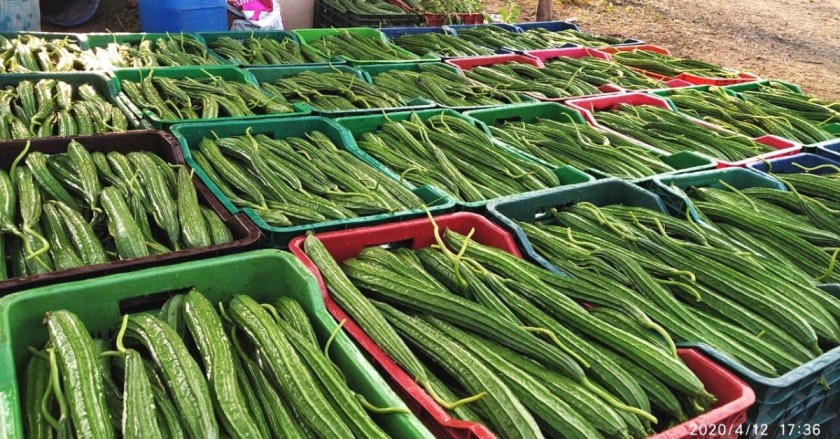In 2009, then 45-year-old Tukaram Gunjal from Nimaj in Maharashtra’s Sangamner taluka spent his days toiling on his 12-acre farm land with his cousins, and lived hand-to-mouth. He’d always followed traditional farming practices and grew conventional crops such as onion, wheat, sugarcane, and other seasonal vegetables.
“There was no progress in terms of farming, income or lifestyle,” Tukaram, now 57, tells The Better India.
Further explaining the limitations he faced with conventional farming, Tukaram says, “My family would spend about 70% of our income on wages to labourers. Our expenses were higher than the earnings. Hence, the change in the crop was needed to reduce dependency on labourers.”
Tukaram says that he was frustrated with his situation and decided to experiment with different crops.
He began on a 2-acre plot of land and started growing tomato, marigold and ridge gourd luffa in rotation. Along with changing crop patterns, he introduced mulching, drip irrigation and adopted farming methods that helped save on chemical fertilisers and pesticides.

Today, he earns Rs 35 lakh from his 12-acre land, and is also able to make one month off a year without any farming activities.
Harvest in sync with the market
Explaining his technique, Tukaram says, “I plough the farm in May and prepare the land with six tractors of cow dung and poultry waste. Once the land is ready, around 8,000 marigold plants are grown from the first week of June onwards. These are harvested in September and the next crop, i.e tomato, is taken for cultivation in early October. Once the tomato harvest reaches 75%, the plantation of ridge gourd luffa begins.”
Tukaram says this pattern ensures that the crops are in sync with market demand and guarantees the best price possible. “Every crop has a harvesting time of 1.5-2 months. If the rates are not good in the first harvest cycle, they improve in the second. The farm produce in the market is planned and sent out when the supply from other regions is low,” he shares.
He adds, “Tomato has a high demand in Sangamner, Surat, Pune and Mumbai. The marigold flowers receive a high price in Bhavnagar and Surat. The ridge gourd luffa has a market in Surat and on the outskirts of Pune.”
Tukaram says that besides mulching and drip irrigation, he set up a farm pond with a water storage capacity of one crore litres and two wells. “This ensures that water supply is sufficient and uninterrupted. It saves water usage, resources, and optimum water supply assures increase in production,” he adds.
In addition, he installed solar trap lights for pest control. “Not all pests are bad for crops. The solar trap lights attract pests and insects that harm the crops at night. The light switches off around 5 am. In the morning, the varieties of pests visiting the farm are different and assist in pollination, which increases production,” he adds.
‘Success is inevitable with passion and sincerity’

Tukaram says he has been able to reap enormous benefits of his efforts for over a decade. Moreover, he has shared the success mantra with over 200 farmers.
Vikram Pawar, a farmer from Lingdev village of Akole taluka, says, “I came in contact with Tukaram around 2011, after learning about his success through a relative. Since then, he has been my mentor and guide in all farming activities.”
Vikram says that he adopted the mulching technique and tomato farming methods from Tukaram and earned Rs 3.5 lakh profits in the first season. “Tukaram guided me at every step and ensured that I did not lose out on productivity and harvest. He also helped me with market linkages. I consult him on choosing crops and identifying potential markets every season,” he adds.
Tukaram says that farmers from Madhya Pradesh, Uttar Pradesh, Karnataka, Gujarat and other states visit his farm. “They stay for a few days to understand the techniques I use. Some farmers who own 200 acres of land visit for advice, which humbles me. My advice to every farmer remains the same – good land preparation and having a positive attitude towards farming,” he says.
He adds, “I urge every farmer to practice agriculture with passion and put sincere efforts. If a farmer follows discipline without compromising on the efforts, success is inevitable.”
Edited by Divya Sethu
No comments:
Post a Comment